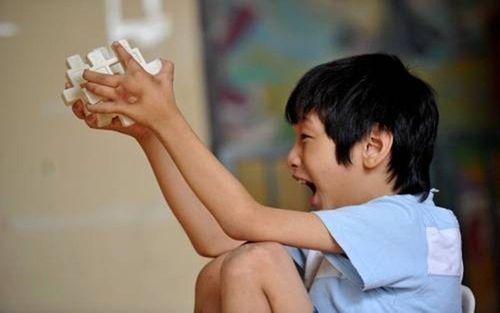This is an automatically translated article.
Dyslexia is a learning difficulty due to the different way the brain processes information. This is a neurological condition and has nothing to do with intelligence, poor upbringing. Proper diagnosis, guidance and support for children with dyslexia can help reduce negative effects.
1. Various symptoms
Childhood dyslexia is a learning disability that is still largely unknown, despite the fact that it affects 1 in 10 school-age children, with prevalence up to 17% . Children with dyslexia are often missed or misdiagnosed, in part because of the wide variety of symptoms. In addition to environmental factors, up to 10 different genes play a role in the development of dyslexia in children. In other words, dyslexia is a neurological problem and can be inherited. There are also cases where some people have dyslexia because of brain injuries.
Most people who hear about this condition think they have trouble reading. In fact, this is only part of the dyslexia. According to experts, children with dyslexia also have problems with handwriting, spelling, oral language, math, planning and motor coordination, organization, sequence, time orientation, concentration and attention, right-left orientation, auditory and visual processing, as well as memory.
Adults with dyslexia will exhibit the above symptoms throughout life. Although it can be difficult, most people with dyslexia can improve their disability with the right support.

Trẻ bị chấn thương não có thể mắc chứng khó đọc
2. Signs of genius quality
In short, dyslexia has many symptoms that make it difficult to detect. And one of the most controversial symptoms is this: intellectual aptitude. Beyond all the spelling and concentration problems, reverse handwriting, and processing problems, kids with dyslexia tend to be extremely smart. In fact, studies have shown that the average IQ of a child with dyslexia is often higher than that of the general population.
These kids push the boundaries of common sense. Specifically, when reading, the baby cannot automatically match the sound emitted with the letter seen. So he uses signs and solves problems in a special way that no one else can notice. Children with dyslexia develop very well at problem solving, at finding alternatives when they cannot read, thereby becoming adept intellectuals. Children with dyslexia often become some of society's greatest thinkers, one expert says.
Multi-talented African-American actor Whoopi Goldberg, American environmental activist Erin Brokovich and history's first female adventurer Ann Bancroft are all famous, successful, and have one thing in common: suffering from epilepsy. hard to read.
3. Easily misdiagnosed or missed

Trẻ có năng khiếu trí tuệ là yếu tố cản trở việc chẩn đoán chứng khó đọc ở trẻ em
It was their excessive intelligence that got them into trouble. Children with dyslexia still pass tests, and they even know how to read early and far ahead of their peers and peers. This prominence makes no one suspect that the child has a learning disability. Intellectual aptitude is a barrier to diagnosing dyslexia in children. Children are often misdiagnosed and accused of being lazy or not trying.
In other cases, dyslexia in children is properly diagnosed, but giftedness is overlooked. Health professionals are still looking for ways to improve, considering the difficulties and research on the future diagnosis plan for the child. But children are a complex complex, the brain adjusts itself and compensates for inherent defects. Therefore, the "genius" quality is often associated with incompetence in a certain field.
As a parent, it's important to be mindful. Don't get so absorbed in the idea that your child is a genius that you don't notice his learning difficulties. On the contrary, do not be too heartbroken when your child is diagnosed with a "learning disability" without seeing his or her own talents. All in all, children are complex creatures, and parents need to find the positives alongside the negatives.
4. Managing dyslexia in children

Tư vấn tâm lý để tránh sự mặc cảm giúp kiểm soát chứng khó đọc ở trẻ
In general, the management of dyslexia in children will require methods such as:
Assess individual needs, develop an individual program tailored to the child. Use supportive learning tools that tap into your baby's senses rather than her brain, such as touch, sight, and hearing. Psychological counseling to avoid guilt, or to spend more time in exams for children with dyslexia. Ongoing assessment to identify areas where dyslexic children are gifted and to provide supportive conditions for their development. There is no cure for dyslexia in children, but some measures will make it easier for children to overcome the condition. However, dyslexia affects each person differently, so each case needs to find a way to accommodate differences in learning and development.
Periodic health check-ups help to detect diseases early, so that there are treatment plans for optimal results. Currently, Vinmec International General Hospital offers a General Health Checkup package for children under 18 years old. This is a comprehensive health check-up package, including a full range of basic functional assessment services for children such as: ear, nose and throat examination, eye examination, assessment of liver and kidney function, heart, lung, blood test, and blood test. hepatitis and nutritional status of the baby.
To register for a general health examination for children, please contact directly to Vinmec Health System nationwide or make an appointment at the website.
Please dial HOTLINE for more information or register for an appointment HERE. Download MyVinmec app to make appointments faster and to manage your bookings easily.
Reference source: babycenter.com













